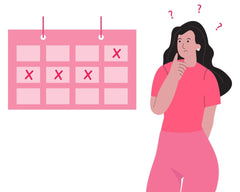Understand Completely About Your Energy Levels During Menstrual Cycle
[article]
Ever wonder why one day you wake up brimming with energy, but you still feel incredibly tired afterward on other days? One significant explanation for this is the hormones. As oestrogen increases, the energy does so, too. When oestrogen fall, the energy goes with it to the south. But then there's the whole issue of progesterone, which also plays a significant role. Here's a complete guide that shows you exactly how each week of your cycle your energy level will be.

1st Week (Days 1 – 7)
On day one, our levels of oestrogen are at their lowest, so don't be surprised if you lack the strength. In the first few days of bleeding, you may get period pain, or feel a bit tired, achy, or irritable. And you can feel super-heavy and or tender to your breasts. Your oestrogen will increase as the days go by, and also more energy during the period. This will make you more potent and more concentrated.
Week – 2 (Days 7 – 14)
Your levels of oestrogen and progesterone steadily keep increasing day by day. Now the bleeding is over (periods can last anywhere from 3-8 days) and your levels of oestrogen and testosterone keep on increasing, you are probably full of energy. Might have boosted the libido. Which could mean the person who sits in class before you – the one you hadn't noticed before – suddenly looks pretty nice.
But go easy – the extra hormone rush will raise anxiety, so surround yourself with people you trust and try some low-impact exercise (swimming, yoga etc.) to keep it at bay.
Week – 3 (Day 15 – 21)
You may feel slightly deflated when your oestrogen levels dip so that, and it may contain progesterone that can drain your strength, it will give you the perfect excuse to vegetate under the covers.
Your hormone levels increase and level out by the end of the week, always providing a feeling of peace and health. For short, the see-saw is once again balanced. Ovulation is this week's main event, which means that if you have unprotected sex, you're more likely to get pregnant now.
Week – 4 (Day 22 – 28)
Others call this PMS (Pre-Menstrual Syndrome) week since oestrogen, testosterone, and progesterone takes a sharp decrease, which also contributes to bluer-than-usual moods.
Your moods may be unpredictable due to the hormone change – don't be surprised if you're unexpectedly annoyed by something like the way a friend eats (even though it didn't concern you before), or you're crying because you missed your bus a nanosecond.
The sudden drop in oestrogen can also interfere with your sleep (yup, the hormone contains sleep-regulating serotonin). But don't try to worry. You are just human, and you will have peaks and lows and a thousand in-betweens like everyone else.
The way we interpret the menstrual cycle's four weeks offers a structure for us to consider the energy expenditure during menstruation and how our hormones fluctuate at different times.
Making a note of how you and your body feels before and during each period will help you understand your behavior and energy levels.
[/article]


















